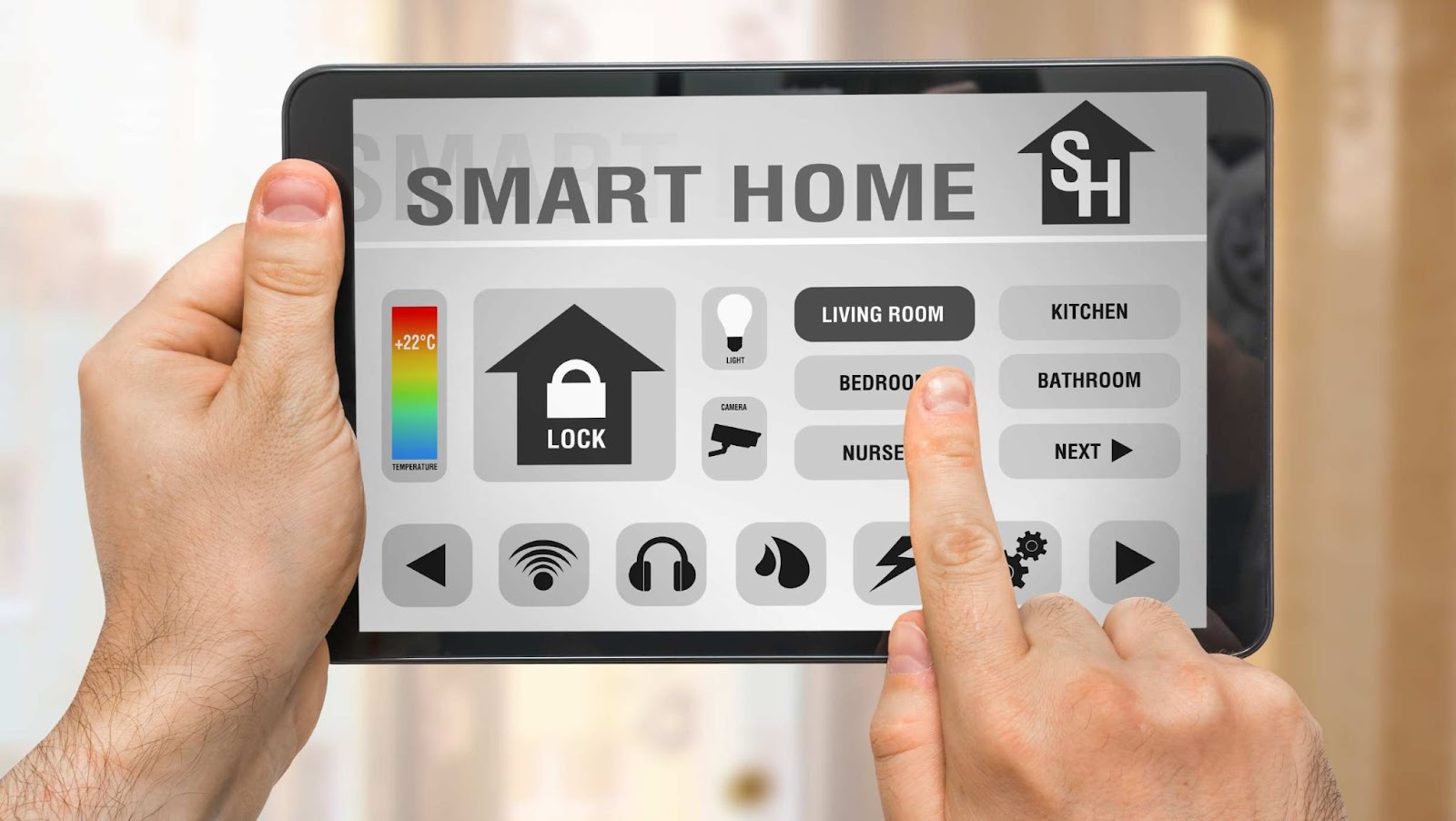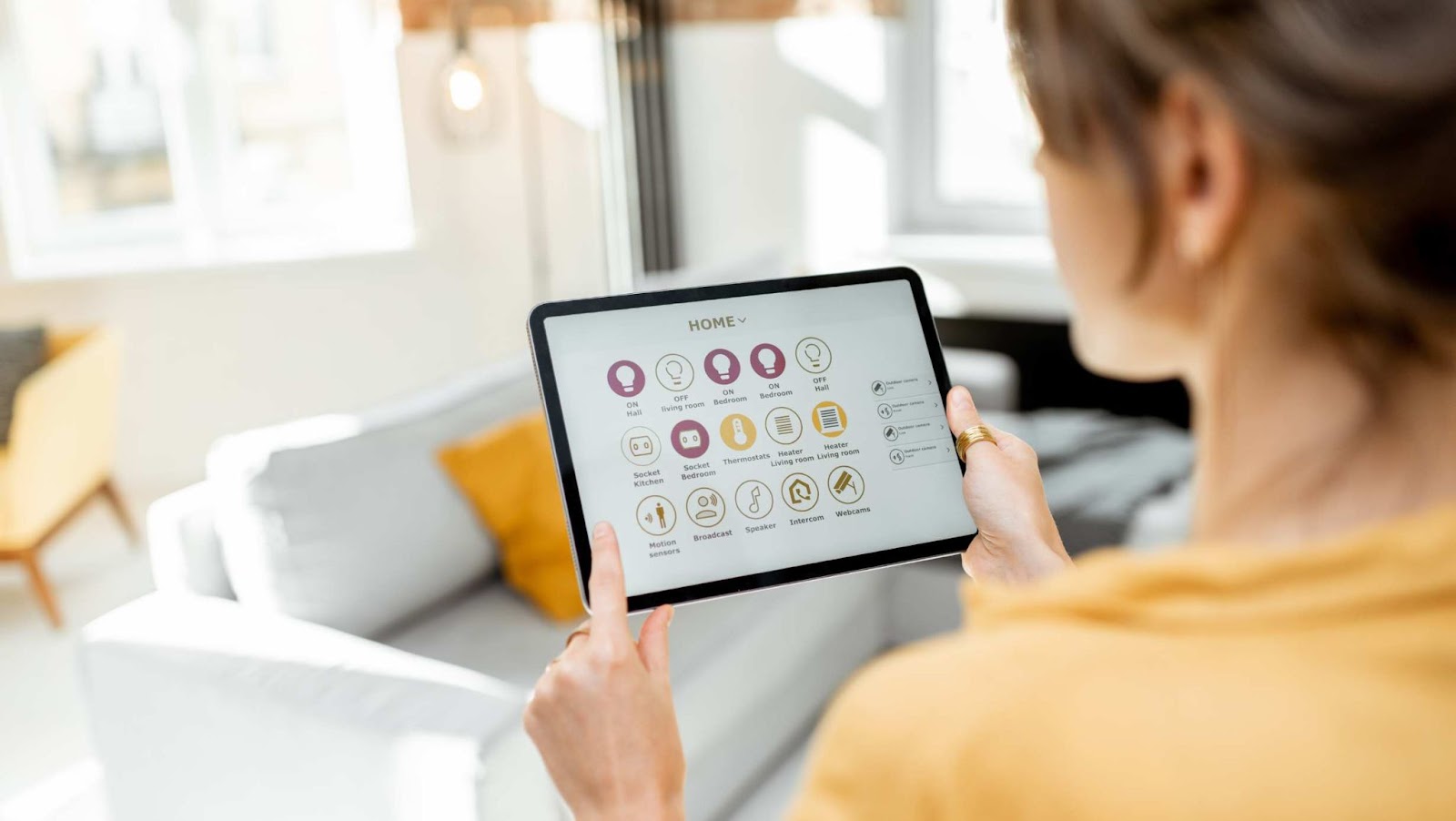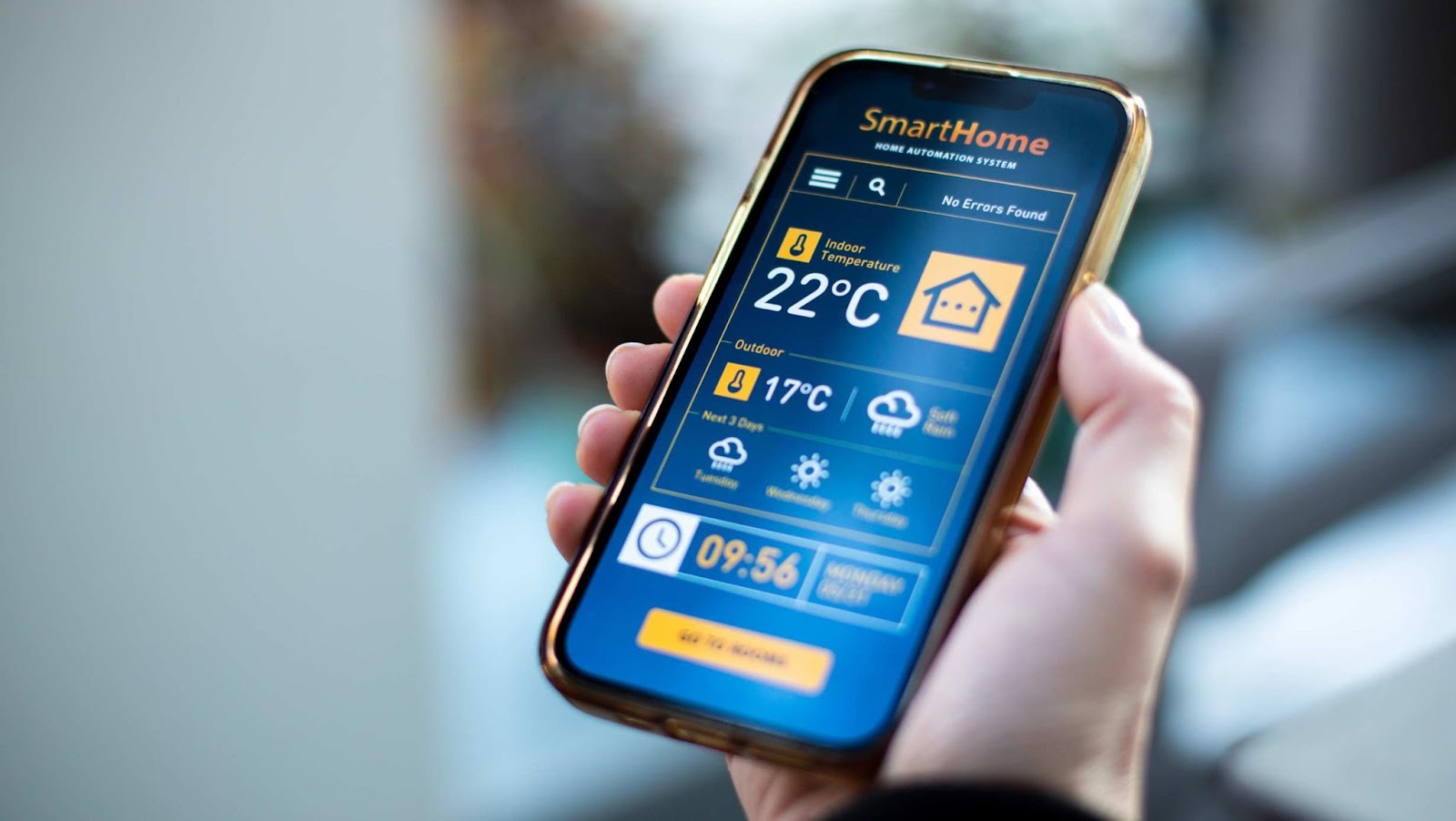Smart home automation has revolutionized how we live, transforming ordinary homes into hubs of efficiency, convenience, and security. Among the technological advancements driving this transformation, smart home apps have emerged as the primary tool for smart home management.
With the rise of mobile app development, these applications have become increasingly sophisticated, empowering users to control their smart homes effortlessly. From controlling devices remotely to personalizing entire ecosystems, mobile apps represent the future of smart home automation.
Here, we examine how app development is reshaping the landscape of smart homes, exploring the trends, technologies, and the significant role these apps play in the home automation industry.

Growing Demand for Smart Home Automation
As technology continues to evolve, the demand for smart home automation has skyrocketed. Homeowners now have the ability to manage virtually every aspect of their home environment from a smartphone, tablet, or even voice-activated assistants like Amazon Alexa and Google Assistant. This demand is driven by an increasing desire for convenience, energy conservation, and improved security.
A smart home can include anything from lighting, temperature control, and security systems to appliances like washing machines, refrigerators, and smart speakers. With a well-designed smart home app, users can integrate all of these elements into one seamless experience, offering unmatched control and comfort.
Key Features of Smart Home Apps
The power of smart home apps lies in their ability to integrate and manage multiple devices with ease. A well-designed app does not just provide basic control but also incorporates intelligent automation, personalization, and security features. Below are some of the key features that smart home apps offer:
1. Remote Control of Devices
One of the core features of a smart home app is the ability to remotely control devices. Whether you’re at work, on vacation, or simply in another room, you can control everything from your thermostat to your lights, all through a smartphone app.
2. Automation and Scheduling
Smart home apps can automate everyday tasks. You can schedule your thermostat to adjust to an optimal temperature before you arrive home, or set your lights to turn off when you leave the house. This level of automation helps conserve energy, reduce utility bills, and enhance convenience.
3. Energy Efficiency
Many homeowners today are concerned with energy efficiency because of our eco-conscious culture. Smart home apps enable users to monitor and control their energy consumption. With features like smart thermostats, energy-efficient lighting, and smart plugs, users can reduce their carbon footprint while saving on energy costs.
According to ScienceDirect, studies indicate that using optimized sensor applications and smart lighting solutions can achieve over 50% savings in electric lighting energy consumption compared to traditional, non-smart systems.
4. Enhanced Security Features
Smart home apps also come equipped with robust security features. From surveillance cameras to motion sensors, users can monitor their property remotely. Many smart home apps integrate motion-detection and real-time notifications, ensuring that homeowners are instantly alerted to any suspicious activity.
5. Voice Control Integration
With the integration of voice assistants like Google Assistant and Amazon Alexa, smart home apps now allow users to control their home via voice commands. This feature enhances convenience and accessibility, especially for individuals with disabilities or those who prefer hands-free control.
Tip: App-Scoop provides innovative mobile app development services that redefine the future of smart home automation. As a leading app development company in Canada and the USA, we leverage IoT and AI to create apps that seamlessly connect devices, ensuring unmatched convenience, security, and energy efficiency.
With a proven track record of delivering top-tier apps, App-Scoop is your trusted partner for turning smart living into reality. Contact us today for a free consultation to bring your smart home vision to life!
Technologies Driving the Future of Smart Home Apps
The future of smart home apps is closely tied to several key technologies. These technologies make smart homes more efficient, user-friendly, and secure. Let’s take a closer look at some of the major technological innovations influencing the development of smart home apps:
1. Internet of Things (IoT)
The Internet of Things (IoT) is the backbone of smart home technology. IoT enables devices to communicate with each other, creating a network of interconnected appliances and systems. With IoT, users can control their entire home through a single app, ensuring that all devices work in harmony.
2. Artificial Intelligence (AI) and Machine Learning (ML)
Artificial intelligence (AI) and machine learning (ML) are transforming smart home apps into intelligent systems that learn and adapt to users’ preferences. These technologies enable apps to anticipate user needs, optimize energy consumption, and enhance the overall user experience. AI-powered predictive analytics can even suggest energy-saving adjustments based on the user’s behavior patterns.
3. Cloud Computing
Cloud technology allows smart home apps to store and process data remotely, reducing the need for extensive processing power on the user’s device. This enables real-time updates and synchronization across all devices in the smart home. Cloud computing ensures that your smart home system is scalable and can be easily updated as new features and devices are added.
4. 5G Connectivity
As the world moves towards 5G technology, the speed and reliability of smart home systems will dramatically improve. 5G allows for faster communication between devices, which is crucial for real-time data processing and remote control.
With 5G, smart home apps can offer smoother, more efficient user experiences, especially with high-bandwidth applications like video streaming and security monitoring.

Role of Smart Home App Development Companies
Smart home app development requires specialized knowledge and expertise. Developers must be proficient in IoT integration, cloud computing, AI, and user experience (UX) design to create apps that offer both functionality and usability. Partnering with a smart home app development company can ensure that your app is tailored to meet the unique needs of your target audience.
These development companies stay ahead of emerging trends and technologies, ensuring that their apps are optimized for future innovations. Whether you are developing a simple app for controlling lights and thermostats or a comprehensive app for managing an entire smart home ecosystem, working with experienced professionals is crucial for success.
Related Articles:
- How Mobile Apps Help Small Businesses Compete with Big Brands?
- Why Startups Need an Experienced App Development Company?
- Outsourcing Software Development Companies vs In-house Hiring: Which is Better?
Smart Home App Development Trends to Watch
The future of smart home is shaped by several exciting trends that promise to transform the user experience:
1. Integration with Wearables
As wearable devices like smartwatches and fitness trackers become more popular, smart home apps are beginning to integrate with them. This allows users to control their home environment based on data from their wearables, such as adjusting the thermostat based on body temperature or sleep patterns.
2. Enhanced Personalization
Future smart home apps will offer more personalized experiences by using machine learning and AI to tailor settings based on individual user behavior. For instance, the app could learn your preferred lighting and temperature settings and automatically adjust them as you enter different rooms or at different times of day.
3. Voice-Controlled Smart Homes
The demand for voice-controlled smart homes is expected to grow exponentially. Voice assistants like Alexa, Google Assistant, and Siri are increasingly integrated into smart home apps, enabling users to control various aspects of their homes using only their voice.
4. Advanced Security Features
As smart homes become more interconnected, security concerns become increasingly important. Future smart home apps will feature more advanced security measures, such as biometric authentication, face recognition, and behavioral analytics, to ensure that only authorized users can access and control the system.

By integrating cutting-edge technologies, app developers are shaping the homes of tomorrow, offering users unparalleled control and automation.
Frequently Asked Questions
What is smart home app development?
Smart home app development involves creating mobile applications that allow users to control and automate various devices in their homes. These devices can include lighting, heating, security systems, and appliances, all of which can be managed remotely through the app.
Why is smart home app development important?
Smart home app development is crucial as it enables users to manage their homes more efficiently, offering convenience, energy savings, and enhanced security. With automation, users can control devices from anywhere, making their living environment more comfortable and adaptable to their lifestyle.
What are the key features of a smart home app?
Key features of a smart home app typically include device control (lights, thermostat, etc.), real-time monitoring, automation and scheduling, remote access, voice command integration, security features (like cameras and alarms), and energy consumption tracking to enhance convenience and efficiency.
What is the future of smart home app development?
The future of smart home app development looks promising with advancements in artificial intelligence (AI), machine learning, and Internet of Things (IoT) technology. These technologies will make home automation more intuitive, proactive, and personalized, with apps able to predict users’ needs and optimize home environments automatically.
How do smart home apps enhance energy efficiency?
Smart home apps improve energy efficiency by allowing users to automate device use based on their habits. For example, they can schedule lights and thermostats to turn off when not in use, monitor energy consumption, and provide suggestions for optimizing energy usage, which ultimately lowers utility bills.
What role does artificial intelligence play in smart home app development?
Artificial intelligence (AI) plays a significant role in smart home app development by making devices smarter. AI can predict user behavior, optimize home automation settings, and improve overall user experience by learning from data and offering personalized recommendations for energy savings and comfort.
How do smart home apps enhance home security?
Smart home apps enhance home security by allowing users to remotely monitor surveillance cameras, lock and unlock doors, set alarms, and receive notifications in case of suspicious activity. Automation features can also activate lights or play sounds when a security threat is detected, simulating presence even when homeowners are away.
Are smart home apps compatible with all devices?
Smart home apps are designed to work with a wide range of devices, but compatibility depends on the platform used and the devices in question. Many apps work with IoT-enabled devices from popular brands, but integration with certain proprietary devices or older models might require specific configurations or updates.
.
How secure are smart home apps?
While smart home apps are generally secure, their security largely depends on the quality of their development and the implementation of measures like encryption, multi-factor authentication, and regular updates. However, as these apps become more popular, they can become targets for cyber-attacks, making it crucial to prioritize security in app design.
What are the challenges faced in smart home app development?
Some challenges in smart home app development include ensuring cross-platform compatibility, integrating with various device types and brands, maintaining high levels of security, and addressing privacy concerns. Additionally, the complexity of creating seamless and intuitive user interfaces while dealing with a wide range of automation features can be a hurdle.



